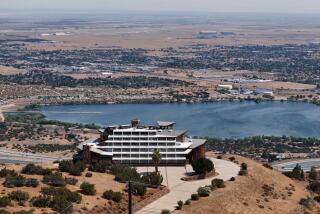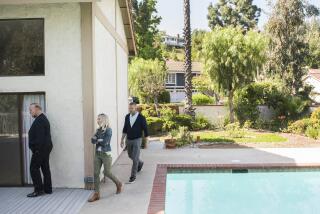Southland housing marketâs 10 fastest-recovering ZIP Codes
Few markets crashed harder than Compton when Californiaâs real estate bubble burst.
The cityâs northwest side saw the median home price plummet to $94,000 in 2009, down from $385,000 at the peak. Foreclosures dotted the streets. Families fled, leaving trash and old furniture behind.
âThere were a lot of empty houses. It was a big mess,â said real estate broker Ruben Magdaleno of Re/Max VIP.
These days, the working-class community has a new identity: comeback kid.
Northwest Compton has posted the most dramatic price jump of any area in Southern California. The median home price in the 90222 ZIP Code rose 96.8% from the second quarter of 2009 to $185,000 at the end of last year.
Southern Californiaâs housing recovery: An interactive map
Although thatâs still a long way from the top, itâs the biggest percentage gain in the Southland, according to a Los Angeles Times analysis of data provided by real estate information firm DataQuick.
Joining Compton among the top 10 fastest-recovering ZIP Codes is a diverse group of communities:
â˘San Diegoâs hip South Park and adjacent neighborhoods (92102), up 96.4% from their bottom to $299,000 in the fourth quarter of last year.
â˘Los Angelesâ tony Hancock Park and diverse Koreatown (90004), up 85.8% to $1,050,000.
â˘The beach community of Cardiff by the Sea (92007) in San Diego County, up 81% to $860,000.
â˘Two blue-collar sections of San Bernardino (92411 and 92405), up 79.4% to $96,000 and up 76.9% to $115,000.
â˘The upscale Newport Coast area in Orange County (92657), up 76.7% to $2,885,000.
â˘The Conejo Valleyâs affluent Westlake Village (91361), up 73.5% to $1,127,500.
â˘The San Gorgonio Pass city of Banning in Riverside County (92220), up 68.4% to $141,000.
â˘Escondidoâs central neighborhood in northern San Diego County (92025), up 67.4% to $370,000.
Overall, the Southern California median price for single-family resale homes has risen 34.5% since bottoming out at the beginning of 2009. The median price is the point at which half of homes sold for more and half for less; it is influenced by the type of homes sold.
The median peaked at $550,000 during the second quarter of 2007 before crashing to $249,000 during the first quarter of 2009, according to DataQuick. At the end of last year, home buyers shelled out a median of $335,000 for a resale home.
âFor the typical person who bought at the peak, they are still a long way away,â said Richard Green, director of USCâs Lusk Center for Real Estate.
So why the big gains in markets as dissimilar as Compton and Newport Coast? In general, those areas got hit harder during the meltdown and so now are particularly attractive to bargain hunters.
Places such as Cardiff by the Sea, Newport Coast and Westlake Village are highly coveted areas with good schools that are always in demand, especially after a rare drop in prices.
Meanwhile, investors are scooping up run-down properties in Compton and San Bernardino to renovate for sale or rent. A flood of foreclosures and short sales in those areas pushed prices to levels so low that recent price gains look huge in percentage terms.
âIt became so toxic that [prices] dropped to almost nothing,â Green said. âInvestors saw great opportunity and started coming into the market at really remarkable bottoms.â
Investor Brian Coomans has done about 35 deals in Compton since the crash, fixing up the properties to rent or sell. In particular, heâs fond of a western portion of the 90222 ZIP Code, with its collection of generally well-maintained single-family homes that saw values plummet.
âIt was just a home run,â he said.
Although rising values are good news for hard-hit communities, some would-be home buyers are having a tough time breaking into the market.
On a recent Saturday, Juan and Lupe Maciel toured a four-bedroom home on West Piru Street in Compton. They already have been outbid on four houses in the city. The nearly $280,000 list price for the Piru Street house was too much, given the repairs needed, they said. If they keep striking out, they may simply continue to rent.
âItâs pretty frustrating,â Lupe Maciel said.
More than 100 miles to the south, sellers in a collection of neighborhoods east of downtown San Diego are getting much higher prices for their properties.
San Diego real estate agent Ed Landsberg said investors have snapped up foreclosures and other distressed properties in the hardest-hit neighborhoods in the 92102 ZIP Code.
âThe low-end stuff â all the investors have gobbled up,â he said.
Meanwhile, the neighborhood of South Park, which fared better during the downturn, has become a magnet for its collection of Craftsman bungalows, restaurants and proximity to downtown, he said. Houses for sale there are extremely hard to come by.
âSouth Park is a real buzz word in San Diego,â said Landsberg, who specializes in the neighborhood.
Whereas investors have played a major role in many neighborhoods, other areas seem to have bounced back simply because they are highly desirable places to live, said Stuart Gabriel, director of UCLAâs Ziman Center for Real Estate.
The price declines were so widespread that even âhigh amenity and well-located marketsâ took major hits to housing values, Gabriel said. That included some areas of Beverly Hills and coastal Orange County, which are now seeing prices roar back in the recovery.
âIt is not surprising that those coveted neighborhoods would see such early and sizable rebounds,â Gabriel said.
In the exclusive Newport Coast community, nestled in the hills above the Pacific Ocean, agents donât have enough homes to sell.
âWe are on fire right now,â said Ann Ngo of HOM Sothebyâs International Realty, who covers Newport Coast.
Some wealthier areas never experienced huge declines. The three ZIP Codes closest to their peak prices are all in upscale neighborhoods of the San Gabriel Valley, where good schools abound and investors from China have pumped money into real estate.
The median sale price in Arcadiaâs 91007 ZIP Code hit $1,199,000 during the fourth quarter of last year â 18% higher than in the fourth quarter of 2007, when the median sale price topped out before declining. The area is the only Southern California ZIP Code to surpass the peak reached during the real estate bubble.
âThere was no significant downturn,â Ash Rizk, a sales associate with Coldwell Bankerâs Arcadia office, said of the city. âWe havenât seen foreclosures; we havenât seen short sales â maybe one sporadically.â
Still, most areas of Southern California arenât likely to return to bubble-era prices any time soon.
âI would say at least another 10 years,â agent Anthony Turner of Prudential California Realty said of Compton, which is one of his coverage areas.
The vast majority of ZIP Codes have recouped less than 30% of their median-price declines from the peaks in those areas. More than half of 464 regional ZIP Codes analyzed by The Times have regained less than 20%.
If prices continue to rise, more home buyers will escape their negative-equity positions. That will allow them to sell their homes without taking a loss, loosening up supply.
But many homeowners who bought at the top of the market are still stuck.
Vincent Waller, a steam plant assistant for the Los Angeles Department of Water and Power, moved into a Compton home with his family in 2008. He said the four-bedroom home is now worth half its $430,000 purchase price.
âTerrible timing,â Waller said on a recent afternoon, taking a break from playing ball with his 6-year-old son, Cazzie, outside his home on 134th Street.
Thereâs not much to do but stick it out, he said. Heâs happy in the neighborhood, although he wishes it had better schools for his children.
If prices keep climbing, the family may recalculate.
âMight try to sell off,â he said.
Times staff writers Alejandro Lazo and Doug Smith contributed to this report.
More to Read
Inside the business of entertainment
The Wide Shot brings you news, analysis and insights on everything from streaming wars to production â and what it all means for the future.
You may occasionally receive promotional content from the Los Angeles Times.










